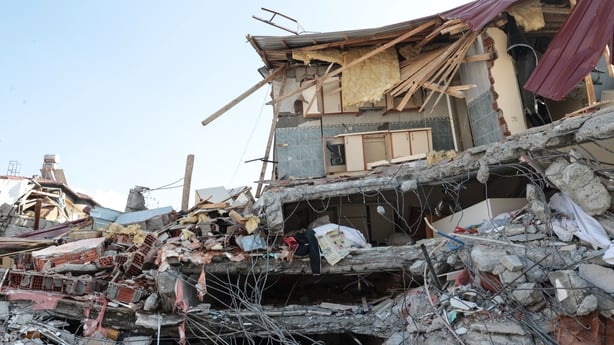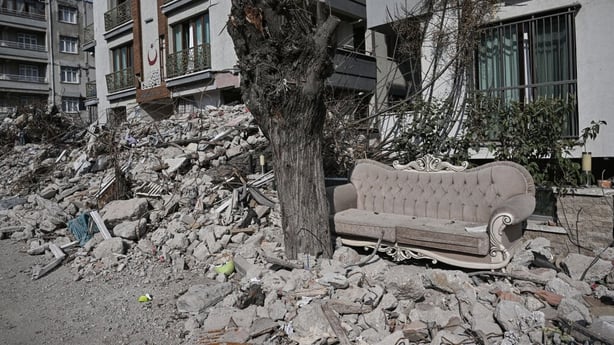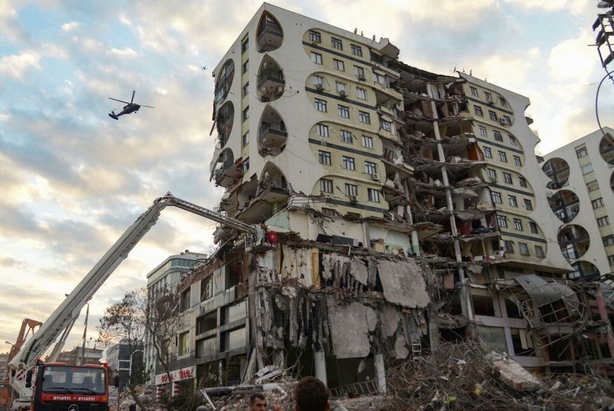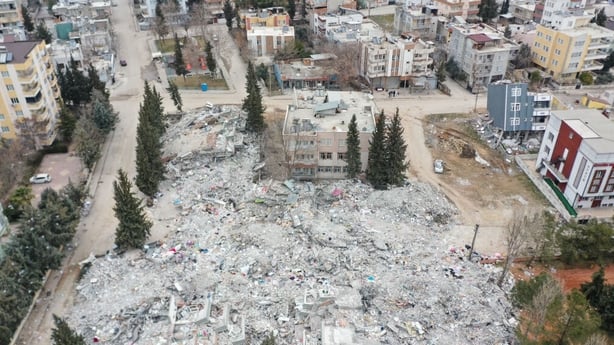Turkey has arrested 184 people suspected of responsibility for the collapse of buildings in this month's earthquakes and investigations are widening, according to a minister, as anger simmers over what many see as corrupt building practices.
More than 160,000 buildings containing 520,000 apartments collapsed or were severely damaged in Turkey by the disaster, the worst in the country's modern history.
Justice Minister Bekir Bozdag said that more than 600 people had been investigated in connection with collapsed buildings, speaking during a news conference in the southeastern city of Diyarbakir, which was among 10 provinces hit by the disaster.
Those formally arrested and remanded in custody include 79 construction contractors, 74 people who bear legal responsibility for buildings, 13 property owners and 18 people who had made alterations to buildings, he said.
Many Turks have expressed outrage at what they see as corrupt building practices and flawed urban developments.
President Tayyip Erdogan, who faces the biggest political challenge of his two-decade rule in elections scheduled to be held by June, has promised accountability.
In the province of Gaziantep, the mayor of the Nurdagi district - who is from Mr Erdogan's ruling AK Party - was among those arrested as part of the investigations into collapsed buildings, state broadcaster TRT Haber and other media reported.

Turkey has issued rebuilding regulations for a region devastated by earthquakes this month to enable companies or charities to help in the urgent task of providing new homes for the millions who need rehousing after the tremors.
The Turkish death toll stands at more than 44,000, while the figure in neighbouring Syria, a nation already shattered by war, is close to 6,000.
Facing an election within months, President Erdogan has pledged to rebuild homes within a year, although experts have said the authorities should put safety before speed. Some buildings that were meant to withstand tremors crumbled in the latest quakes.
Many survivors have left the region of southern Turkey that was hit or have been settled in tents, container homes and other government-sponsored accommodation.

One volunteer at an aid distribution centre in the town of Hassa said the shortage of tents remained the biggest problem.
Under the new regulations, individuals, institutions and organisations will be able to build residences and workplaces that they can donate to the urbanisation ministry and those properties will then be handed to those in need, according to a presidential decree published in the Official Gazette.

The Turkish government's initial plan is to build 200,000 apartments and 70,000 village houses at a cost of at least €14bn, he said.
The United Nations Development Programme said it estimated that the destruction has left 1.5 million people homeless, with 500,000 new homes needed.
It said it had requested €108m from the €1bn in funds appealed for by the UN last week, adding that it would focus this money on clearing away mountains of rubble.
The UNDP estimates that the disaster has produced between 116 million and 210 million tons of rubble, compared with 13 million tons of rubble after an earthquake in northwest Turkey in 1999.

In Antakya, Saeed Sleiman Ertoglu, 56, loaded up what remained of his stock from his waterpipe shop that was not damaged in the two massive earthquakes on 6 February followed by another strong quake two weeks later.
"The glassware was very beautiful, more than usual, but then we had this (earthquake), and it all got ruined," he said, after his home and shop survived the first tremors but not the later one. He estimated that 5% of his merchandise survived.
"What can we do? This is an act of God, and God's will always bears gifts," he said.
Quake-prone Istanbul not at heightened risk - expert
Fears of another major earthquake have been rekindled in Istanbul since the 6 February disaster, but a prominent Turkish seismologist has reassured the risk "hasn't increased".
"The risk hasn't increased because we are talking about completely different systems," Dogan Kalafat, the director of the Kandilli Observatory's Earthquake-Tsunami Monitoring Center in Istanbul, said.
Turkey's most populated city is situated near the North Anatolian Fault while the recent 7.8-magnitude quake occurred along another fault in the country's southeast, Mr Kalafat explained.
Still, the 16 million residents of Istanbul, a city that spreads over two continents and has seen skyscrapers mushroom in recent years, are wondering if they're ready for the "Big One".
"I'd like to say it, but sadly, it's a very big city with too many poorly constructed buildings," said Mr Kalafat, who has denounced using low-quality cement and building on "soft soils".
While waiting for a large-scale quake, "we must make good use of the time. We must build earthquake-proof houses on solid soil. It's the most important precaution to take," the seismologist stressed.

